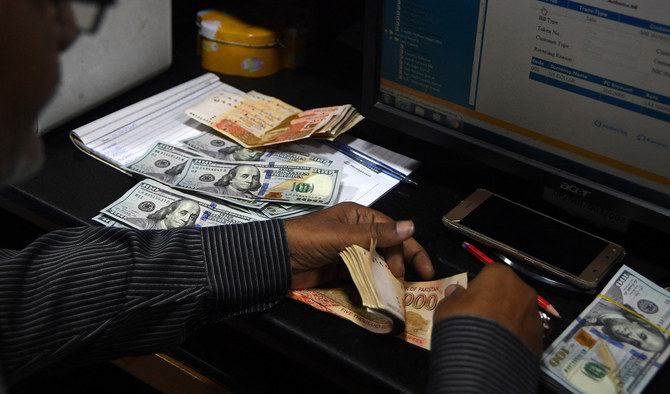KARACHI: Pakistan’s national currency posted gains for the sixth consecutive day on Friday, currency dealers and analysts said, following the return of Ishaq Dar as the new finance minister and amid hopes that the International Monetary Fund (IMF) would ease off some harsh conditions.
The 72-year-old financial wizard took oath as a federal minister on Wednesday, five years after he was ousted from the role in a corruption case. A member of Prime Minister Shehbaz Sharif’s ruling Pakistan Muslim League-Nawaz (PML-N) party, Dar has already been the finance minister four times.
Pakistan's currency market has shown some signs of stability after the change of command at the finance ministry, with the Pakistani rupee gaining 0.52 percent of its value against the US dollar on Friday. The greenback closed at Rs228.45 at the end of week.
The Pakistani currency has appreciated 4.84 percent during the last six trading sessions and 4.7 percent since September 23, when the dollar was trading at Rs239.65, after the market sentiment changed following Dar's takeover of the finance portfolio.
“The perception of Ishaq Dar as strict controller of exchange rate has changed the market sentiment. Exporters and individuals who were withholding dollars have come out to sell which has strengthened rupee,” Tahir Abbas, head of research at the Karachi-based Arif Habib Limited brokerage firm, told Arab News.
“The expectation of around $3.5 billion additional inflows from the World Bank and the Asian Development Bank, and the hopes that IMF will ease off some of the targets set in the program as the country is facing flood disaster have strengthened the rupee.”
Dar takes the driving seat of Pakistan’s economy at a time when the South Asian country is grappling with a balance-of-payment crisis, depleting foreign exchange reserves, high inflation and a weakened currency.
On Friday, the finance ministry reiterated the country’s economic growth would remain below 3 percent from a 5 percent budgetary target for 2022-23, amid an uncertain outlook.
“The economic outlook for Pakistan in the current fiscal year has become uncertain and will likely remain below the target,” the ministry said in its monthly economic report. "Macroeconomic imbalances may ease with the expected slowdown in the economic growth."
Pakistani currency dealers suggest few steps to control the exchange rate and curb speculations in the currency market.
“Dar has a reputation of strengthening rupee and improving economy and he seems confident to achieve his goals,” Malik Bostan, president of Forex Association of Pakistan who spoke to the new finance minter after he took over the office, told Arab News.
“We have pinpointed few factors that were responsible for the rupee's depreciation, including organized maneuvering of exchange rate in the interbank market which is now being probed. He is upbeat for the economic turnaround.”
The change at finance ministry comes at a time when the South Asian nation is reeling from the impacts of historic floods that have submerged a third of the country and inflicted around $30 billion in economic losses.
The finance ministry conceded that the outlook of the country’s agriculture sector was not clear after the floods damaged winter crops, including cotton and rice.
“The agricultural outlook is still not clear as the output of both important and other Kharif crops has suffered significantly due to recent floods and unprecedented heavy monsoon rains,” it said in the monthly economic report, adding that floodwater in agricultural areas might also affect the Rabi crops.
While the full extent of damages is still being estimated, Islamabad is expecting a debt relief from the Paris Club and G-20 nations that will help strengthen the national currency.
Apart from the currency's stability, the incoming finance minister has vowed to tame inflation that hit a 47-year high of 27.3 percent in August.
However, the finance ministry has warned that the inflation will not ease off even after the fall in commodity prices in the global market.
“Even if international commodity prices would mean-revert in the near future, domestic inflation may still suffer from delayed adjustments and second-round effects,” the ministry said in its report.
"Also, the depreciation of the PKR continues to exert upward pressure on domestic prices."
Pakistan’s weekly inflation once again increased by 0.94 percent during the week ending on September 29, after recording a decline of 8.11 percent the previous week, mainly due to the spike in the prices of food items, according to official data released on Friday.
Pakistan’s stock market also closed bullish on Friday, with key stock index gaining 0.28 percent to close at 41,128.67 points.












